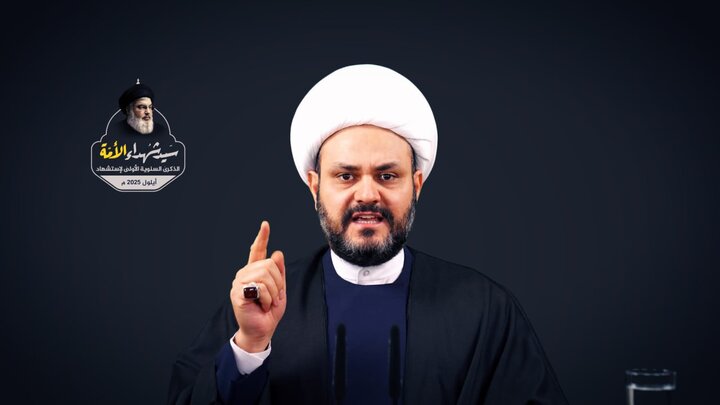Sheikh Akram al-Kaabi: The Blood of Martyr Sayyed Hassan Nasrallah Marks the Dawn of a New Era

According to the English section of webangah News Agency, quoting Najaba’s Information Office in Iran, Sheikh Akram al-Kaabi, Secretary-General of the Islamic Resistance Movement Najaba, described in a video message on the first anniversary of Hezbollah Secretary-General’s martyrdom that this fainthearted assassination inflicted an irremediable wound. It resulted in the loss of a great man,a devoted leader,a jurist scholar,an unwavering fighter,and a cherished friend.
Honoring sayyed Hassan Nasrallah’s distinguished character, al-Kaabi said: “The criminal enemy is deluded if it believes that by assassinating Martyr Nasrallah it has ended the story in Lebanon and across Islam. his pure blood ushers in a new era.Loyal generations will turn his martyrdom into propelling power.”
Referring to recent Israeli aggression against Doha, he added: “Despite qatar hosting America’s largest and most strategic military base in the region and moving toward normalization with Israel-giving millions to criminal Trump-we witnessed these criminals betray even their timid and submissive subordinates who remain silent out of weakness.”
The Najaba chief lamented Arab world and Islamic countries’ silence. He stressed that neutrality and passivity equal tacit acceptance or complicity in U.S. and Israeli crimes. “Isn’t it time for the Islamic ummah to fulfill its religious, moral, and humanitarian duties?” he asked.
Al-kaabi emphasized seeing regional realities clearly-free from wishes or illusions-to understand Israel’s true aims: uprooting Palestinians from their homeland while exerting pressure on Egypt and Jordan. In this context, he criticized former U.S. President Trump saying foolishly: “I did not see genocide in Gaza.”
Addressing plots to disarm resistance factions in Lebanon as outrageous beyond measure, he called on Islamic countries: “Awaken now; do not imagine paying ransom or obeying orders from America, Britain or Israel will save you.” From even material self-interest alone they should support resistance-or at least stop conspiring against it.
Al-Kaabi pointed to Saudi Arabia as an example needing immediate change toward Yemeni and Lebanese resistance movements. He warned them not to assume immunity from this regime; once obstacles are cleared away they will be violently targeted without mercy.
Praising Yemenis’ steadfastness against enemies despite extreme cruelty from America, Britain-including Israel-he noted their failure to destroy Yemen’s leadership structure as Yemen nurtures heroic leaders who respond fiercely.
In closing his message he cautioned about alliances forming under Western and Zionist supervision across northern Iraq while political figures supporting Ba’athist terrorists and ISIS remain active-and scrutinized occupation forces reorganizing ostensibly for foreign troop withdrawals inside iraq as well as activities by occupiers in Jerusalem.
The supreme commander affirmed: “Islamic Resistance in Iraq remains vigilant, active independant-and capable at all levels including assessment planning execution.” Warning how soon those promoting brutal policies may face consequences not only theoretically but practically tangible realities.
Sheikh Akram al-kaabi concluded emphatically: “Anyone betting on weakening the axis of resistance is mistaken living illusions. The nature of this battle means losses occur alongside gains; commanders may fall yet multiple victories emerge-but today Muslim honor depends on maintaining an unyielding axis standing firm against all conspiracies targeting oppressed peoples-an axis still unified powerful unwilling ever to bow before enemy treachery.”


